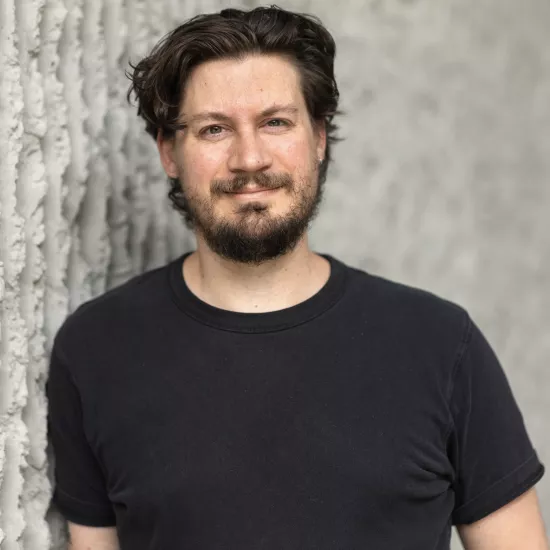
Derek Denis
Title/Position
Associate Professor, Linguistics
Language Studies
-
E-mail:
-
Phone:
-
Website:
-
Room:MN 4162
-
Mailing Address:
3359 Mississauga Road
Maanjiwe nendamowinan, 4th floor
Mississauga ON L5L 1C6
Canada
Graduate Appointment: Graduate Linguistics Program
Derek’s research primarily focuses on Canadian English. His early work investigated earlier Canadian English using archival oral history recordings in an effort to understand a previous stage of Ontario English. Since arriving at UTM he has looked more toward the future, asking questions about how the many languages spoken by Torontonians may come to influence Toronto English. When not being a linguist, he can be found lifting heavy weights, playing Magic: The Gathering, or snoozing on the dock at the cottage.
Current Courses
Fall/Winter 2025–26:
- JAL355 (Language and Gender)
- LIN208 (English Sounds)
- LIN256 (Sociolinguistics)
- LIN318 (Talking Numbers: Interpretation and Presentation of Quantitative Linguistic Data)
- LIN399 (Research Opportunity Program)
Education
- PhD, Linguistics, University of Toronto
- MA, Linguistics, University of Toronto
- HBA, Linguistics, University of Toronto
Areas of Teaching and Research Interests
- Sociolinguistics (variationist and sociocultural)
- World Englishes/Canadian English
- Multiethnolects
- Language contact, colonialism, and new-dialect formation
- Pragmatic markers
- Formal approaches to sociolinguistic variation
Selected Publications
Books
- Schilling, Natalie, Derek Denis, and Raymond Hickey (eds.). New Cambridge History of the English Language Volume V: English in North America and the Caribbean. Cambridge: Cambridge University Press. (forthcoming)
- English in Multicultural Context: Ideologies of Place and Race in Linguistic Variation and Change. (under contract with Cambridge University Press)
- Essentials of Linguistics, Second Edition (2022). With Catherine Anderson; Bronwyn Bjorkman; Julianne Doner; Margaret Grant; Nathan Sanders; and Ai Taniguchi
Articles
- Jackson, S., & Denis, D. (2024). What I say or how I say it? Ethnic accents and hiring decisions in the Greater Toronto Area. Language, 100(2):e27–262.
- Denis, D., Elango, V., Kamal, N. S. N., Prashar, S., & Velasco, M. (2023). Exploring the vowel space of Multicultural Toronto English. Journal of English Linguistics, 51(1): 30–65.
- Denis, D. (2021). Raptors vs. Bucktees: The Somali influence on Toronto Slang. Journal of Multilingual and Multicultural Development, 42(6): 565–578.
- Wiltschko, M., Denis, D., & D’Arcy, A. (2018). Deconstructing variation in pragmatic function: A transdisciplinary case study. Language in Society, 47(4): 569–99.
- Denis, D., & D’Arcy, A. (2018). Settler Colonial Englishes are distinct from Postcolonial Englishes. American Speech, 93(1): 3–31.
Selected Grants, Fellowships and Awards
- Early Career Researcher Award, Canadian Linguistic Association, 2024
- SSHRC Insight Development Grant, Principal Investigator, 2020–2024, Multicultural Toronto English: Identity and Ideologies
- Research and Scholarly Activity Fund, Office of the Vice-Principal Research, UTM, 2020, Multicultural Toronto English: Sources and Discourses
- Numeracy Development Initiative (LIN256, Sociolinguistics), Robert Gillespie Academic Skills Centre, UTM, 2019–2020
- Connaught New Researcher Award, Principal Investigator, 2018–2023, New-dialect formation in a Toronto neighbourhood of first arrival
- Audrey Duckert Award for Early Career Scholars, American Dialect Society, 2016
- SSHRC Postdoctoral Fellow, University of Victoria, 2015–2017
